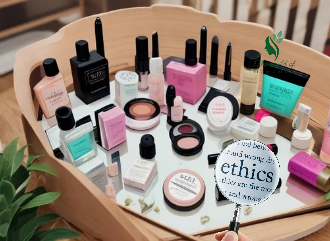Ethical Beauty Brands
Introduction
In recent years, there has been a growing demand for beauty products that not only make us look good but also align with our values and ethics. Ethical beauty brands have emerged as a response to this demand, offering products that are not only effective and innovative but also sustainable, cruelty-free, and socially responsible. This article shines a spotlight on the world of ethical beauty brands, exploring their commitment to sustainable sourcing and production practices, their dedication to cruelty-free and vegan formulations, their initiatives for fair trade and ethical supply chains, their focus on eco-friendly packaging and recycling, their engagement in social responsibility and community empowerment, their transparency in ingredient disclosure and testing, and offers valuable consumer tips for supporting and embracing ethical beauty brands. Let's dive into the world of beauty that goes beyond superficiality and embraces ethical values.1. Introduction to Ethical Beauty Brands
Understanding the Rise of Ethical Beauty
In recent years, there has been a significant shift in consumer preferences towards more ethical and sustainable choices. This shift is not limited to the food and fashion industries, but has also extended to the beauty industry. Ethical beauty brands have gained popularity as people become increasingly aware of the environmental and social impacts of their purchasing decisions.Defining Ethical Beauty Brands
Ethical beauty brands are those that prioritize sustainable and ethical practices throughout their entire production process. These brands are committed to making a positive impact on the environment, while also valuing the welfare of animals and the people involved in the production chain. From sourcing ingredients to packaging, ethical beauty brands strive to minimize their ecological footprint and promote social responsibility.
2. Sustainable Sourcing and Production Practices
Using Organic and Natural Ingredients
One of the key practices of ethical beauty brands is the use of organic and natural ingredients. These brands prioritize sourcing ingredients that are grown without the use of harmful chemicals, pesticides, or genetically modified organisms (GMOs). By doing so, they not only ensure the safety and quality of their products, but also support sustainable farming practices.Implementing Sustainable Farming and Harvesting
Ethical beauty brands go beyond just using organic ingredients and also focus on sustainable farming and harvesting practices. They work closely with farmers and growers to ensure that the land and ecosystems are protected during cultivation. These brands prioritize biodiversity and work towards preserving the natural resources that contribute to the production of their ingredients.Reducing Water and Energy Consumption
Another aspect of sustainable production practices is the conscious effort to reduce water and energy consumption. Ethical beauty brands implement innovative manufacturing techniques and invest in renewable energy sources to minimize their environmental impact. By prioritizing energy efficiency and waste reduction, these brands strive to create a more sustainable future.3. Cruelty-Free and Vegan Beauty Brands
Eliminating Animal Testing
A core value of ethical beauty brands is their commitment to eliminating animal testing. These brands firmly believe that beauty should not come at the expense of animal welfare. Instead, they rely on alternative testing methods, such as in vitro testing and human volunteers, to ensure the safety and efficacy of their products. By taking a stand against animal cruelty, ethical beauty brands offer consumers a guilt-free choice.Certifications for Cruelty-Free and Vegan Products
To provide transparency and assurance to consumers, ethical beauty brands often seek certifications from reputable organizations. Certifications such as Leaping Bunny and PETA's Beauty Without Bunnies program indicate that a brand is cruelty-free. Moreover, vegan certifications certify that a product does not contain any animal-derived ingredients. These certifications help consumers make informed choices and support brands that align with their values.Alternative Ingredients for Vegan Beauty
Vegan beauty brands take extra care to avoid using animal-derived ingredients. Instead, they focus on finding innovative, plant-based alternatives. By exploring a wide range of botanical extracts and other natural sources, these brands are able to create high-quality products that are both vegan and effective. Vegan beauty has come a long way, offering a diverse range of options without compromising on performance.
4. Fair Trade and Ethical Supply Chain
Ensuring Fair Wages and Working Conditions
Ethical beauty brands recognize the importance of fair wages and working conditions for all individuals involved in their supply chain. They prioritize partnerships with suppliers who follow fair trade principles and ensure that workers are treated with dignity and respect. By supporting fair labor practices, ethical beauty brands contribute to the well-being of communities and promote social justice.Supporting Small-scale Farmers and Artisans
In addition to fair wages, ethical beauty brands also support small-scale farmers and artisans. By sourcing ingredients from these communities, they help create sustainable livelihoods and preserve traditional knowledge. Supporting these local economies not only promotes economic growth but also ensures the preservation of cultural heritage.Promoting Ethical Trade Partnerships
Ethical beauty brands actively seek out ethical trade partnerships to ensure that their ingredients are sourced responsibly. They work directly with communities and cooperatives, building long-term relationships based on mutual respect and fair trade principles. By partnering with ethical suppliers, these brands contribute to the empowerment of marginalized communities and foster a more equitable global trade system.With their commitment to sustainability, cruelty-free practices, and ethical sourcing, ethical beauty brands are revolutionizing the beauty industry. By supporting these brands, consumers can make a positive impact on the world while still looking and feeling their best.5. Eco-Friendly Packaging and Recycling Initiatives
Using Sustainable and Recyclable Materials
Gone are the days when beauty brands could get away with excessive packaging made from non-recyclable materials. Ethical beauty brands are leading the charge in using sustainable and recyclable materials for their packaging. From bamboo and glass to biodegradable plastics and recycled paper, these brands are making eco-friendly choices without compromising on style and functionality.
Reducing Packaging Waste
Ethical beauty brands understand that less is more when it comes to packaging. They are taking steps to minimize packaging waste by opting for streamlined designs and eliminating unnecessary layers. By reducing the amount of packaging used, these brands are not only reducing waste but also saving valuable resources in the process.Implementing Recycling Programs
Ethical beauty brands are not just concerned about the packaging they use, but also about what happens to it after it has served its purpose. Many of these brands have implemented recycling programs, where customers can return empty containers for proper recycling. This not only encourages responsible disposal but also helps to close the loop on the product lifecycle, ensuring a more sustainable future for the beauty industry.6. Social Responsibility and Community Engagement
Supporting Local Communities
Ethical beauty brands recognize the importance of supporting local communities. They often source ingredients from local farmers, artisans, and cooperatives, ensuring fair wages and sustainable practices. By investing in local communities, these brands not only promote economic growth but also celebrate cultural diversity.Charitable Initiatives and Donations
Beyond supporting local communities, ethical beauty brands also contribute to charitable initiatives. From donating a portion of their profits to partnering with organizations dedicated to social causes, these brands go beyond beauty to make a positive impact on society.Empowering Women and Marginalized Groups
Ethical beauty brands understand the power of empowerment. Many of them actively seek to uplift women and marginalized groups by providing fair employment opportunities and supporting skill-building programs. By prioritizing diversity and inclusivity, these brands are making a statement that beauty is for everyone.
7. Transparency in Ingredient Disclosure and Testing
Clear Labels and Ingredient Lists
Gone are the days when deciphering a beauty product's ingredient list felt like cracking a secret code. Ethical beauty brands prioritize transparency by providing clear and easily understandable labels and ingredient lists. They believe that customers deserve to know exactly what they are putting on their skin and make informed choices.Third-Party Testing and Certifications
To further ensure the safety and efficacy of their products, ethical beauty brands often rely on third-party testing. By subjecting their products to rigorous evaluations by independent experts, these brands provide an additional layer of assurance to their customers. Look out for certifications from trusted organizations that confirm a brand's commitment to ethical practices.Educating Consumers about Harmful Ingredients
Ethical beauty brands take on the role of educators, aiming to empower consumers with knowledge about harmful ingredients commonly found in beauty products. Through informative content and resources, these brands help consumers make informed decisions about the products they choose, ultimately promoting healthier and safer beauty routines.8. Consumer Tips for Supporting Ethical Beauty Brands
Researching and Identifying Ethical Brands
When in doubt, do some research! Take the time to identify and support ethical beauty brands that align with your values. Look for brands that prioritize sustainability, social responsibility, and transparency. Websites, social media, and ethical beauty directories can be great resources to help you find the perfect fit.Understanding Labels and Certifications
Labels and certifications can be confusing, but they can also provide valuable insights into a brand's ethical practices. Educate yourself about the different certifications and what they represent. Look for trusted symbols that indicate cruelty-free, vegan, or organic products to guide your purchasing decisions.Supporting Local and Independent Beauty Brands
While it's tempting to stick with well-known beauty conglomerates, consider supporting local and independent beauty brands. These brands often have a strong commitment to ethical practices and are more likely to prioritize sustainability, community engagement, and transparency. Plus, discovering a hidden gem can be incredibly rewarding!Remember, supporting ethical beauty brands is not just about looking good but also feeling good about the choices you make. By embracing these values, you can contribute to a more sustainable and compassionate beauty industry.As consumers become more conscious about the impact of their choices, supporting ethical beauty brands is a powerful way to align personal values with everyday routines. By choosing products from brands committed to sustainability, cruelty-free practices, fair trade, and social responsibility, we can contribute to a more ethical and sustainable beauty industry. Whether it's opting for organic ingredients, recyclable packaging, or supporting local communities, our choices matter. So, let's continue to educate ourselves, make informed decisions, and support the ethical beauty brands that are paving the way towards a more beautiful and responsible future.
FAQ
1. Are ethical beauty brands more expensive than conventional brands?
While some ethical beauty brands may have higher price points compared to conventional brands, it's important to consider the value you are getting. Ethical beauty brands often prioritize quality, sustainability, and fair trade, which can contribute to slightly higher costs. However, many ethical beauty brands offer affordable options and prioritize transparency in pricing, ensuring that consumers understand the reasons behind the price.
2. How can I verify if a beauty brand is truly ethical?
Verifying the ethical practices of a beauty brand can involve multiple factors. Look for certifications such as cruelty-free logos, vegan certifications, and organic certifications. Additionally, research the brand's sustainability initiatives, sourcing practices, and community engagement efforts. Ethical beauty brands typically provide transparent information on their websites or product packaging to showcase their commitment to ethical practices.
3. Can I find ethical beauty brands in local stores or only online?
While some ethical beauty brands may be primarily available online, many are also stocked in local brick-and-mortar stores. Check out health food stores, natural beauty boutiques, and ethical marketplaces in your area. Additionally, major retailers are increasingly dedicating shelf space to ethical beauty brands, making it easier to find them in physical stores.





